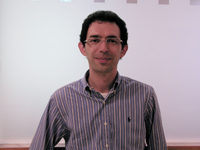Mirko Paiardini, PhD

Contact Information
Additional Websites
Associate Professor, Emory Vaccine Center
Associate Professor, Department of Pathology and Laboratory Medicine, Emory University School of Medicine
Researcher, Emory National Primate Research Center
Investigator, Emory Center for AIDS Research
Mirko Paiardini completed his undergraduate and graduate work at the University of Urbino, Italy. Before joining Emory, Dr. Paiardini was a research associate in the laboratory of Dr. Guido Silvestri at the University of Pennsylvania School of Medicine.
Our research program focuses on studies of HIV/AIDS pathogenesis. We follow a comparative approach using humans and nonhuman primate models of pathogenic and nonpathogenic HIV/SIV infections with the aims to define the immunological features allowing SIV-infected natural hosts to avoid progression to AIDS. One of the main interests is on the homeostatic regulation of CD4+ T cell subsets. Our recent work suggests that preservation of Th17 cell homeostasis, particularly at the mucosal sites, and low levels of SIV infection in central memory CD4+ T cells are two main mechanisms contributing to the ability of sooty mangabeys to remain AIDS-free despite supporting high levels of viral replication. Our efforts are now directed in translating this new knowledge in new immune modulatory approaches to ameliorate the course of disease in HIV-infected individuals.
Research Interests:
Our research focuses on studies of HIV/AIDS pathogenesis, with a specific interest in (i) define the immunological features allowing SIV-infected natural hosts to avoid progression to AIDS, and (ii) design new immune modulatory interventions to ameliorate the course of disease in HIV-infected individuals. Dr. Paiardini’s recent work suggests that preservation of intestinal Th17 cells and low levels of SIV infection in central memory CD4+ T cells are two main mechanisms contributing to the ability of natural hosts to remain AIDS-free despite high levels of viral replication.
1. Improved Th17 cell homeostasis and intestinal immunity in Interleukin (IL)-21 Treated SIV-infected rhesus macaques
HIV infection is associated with a severe dysfunction of mucosal immunity. We previously showed that Th17 cells, a CD4+ T cell subset specialized for mucosal antibacterial and antifungal activity, are preferentially depleted in the gastrointestinal tract of HIV infected individuals (Brenchley JM, Blood 2008). In the same manuscript, we showed that intestinal Th17 cells are preserved at healthy frequencies in SIV infected sooty mangabeys (SMs), natural host for SIV that avoid progression to AIDS. Several independent groups have subsequently confirmed the differential homeostasis of intestinal Th17 cells in pathogenic and nonpathogenic lentiviral infections. Based on these data, one of the main interests in our lab is to define the molecular mechanisms allowing SIV-infected SMs to preserve intestinal Th17 cells, as well as to design new immune modulatory interventions aimed at improving Th17 cell homeostasis in HIV-infected humans. To this aim, we recently started a study in which Interleukin (IL)-21, a cytokine critical for the generation and survival of Th17 cells (Micci L, Blood 2012), was administered in vivo in SIV-infected rhesus macaques. The two main goals of this study are to determine if IL-21 treatment will improve Th17 cell homeostasis and intestinal immunity and if it will be effective in ameliorating SIV disease progression.
2. Low levels of SIV infection in sooty mangabey central memory CD4+ T cells
In naturally SIV-infected SMs central memory CD4+ T cells are relative protected from SIV infection when compared to the same cells in rhesus macaques (Paiardini M, Nature Medicine 2011). The ability of SMs to protect central memory CD4+ T cells from infection is critical for the nonprogressive nature of SIV infection in these animals (Paiardini M, Nature Medicine 2011; Chahroudi A, Science 2012). We are now investigating the importance of these findings for HIV infection in humans. Specifically, we would like to determine if the infection of central memory CD4+ T cells is a prognostic marker of both HIV-associated immune activation and disease progression in HIV-infected humans, as well as if residual infection of central memory CD4+ T cells is a predictor of persistent immune activation and poor immune reconstitution in ART-treated individuals. To answer these questions, we recently established strong collaborations with clinicians at Emory, San Francisco and Cleveland Centers for AIDS Research.